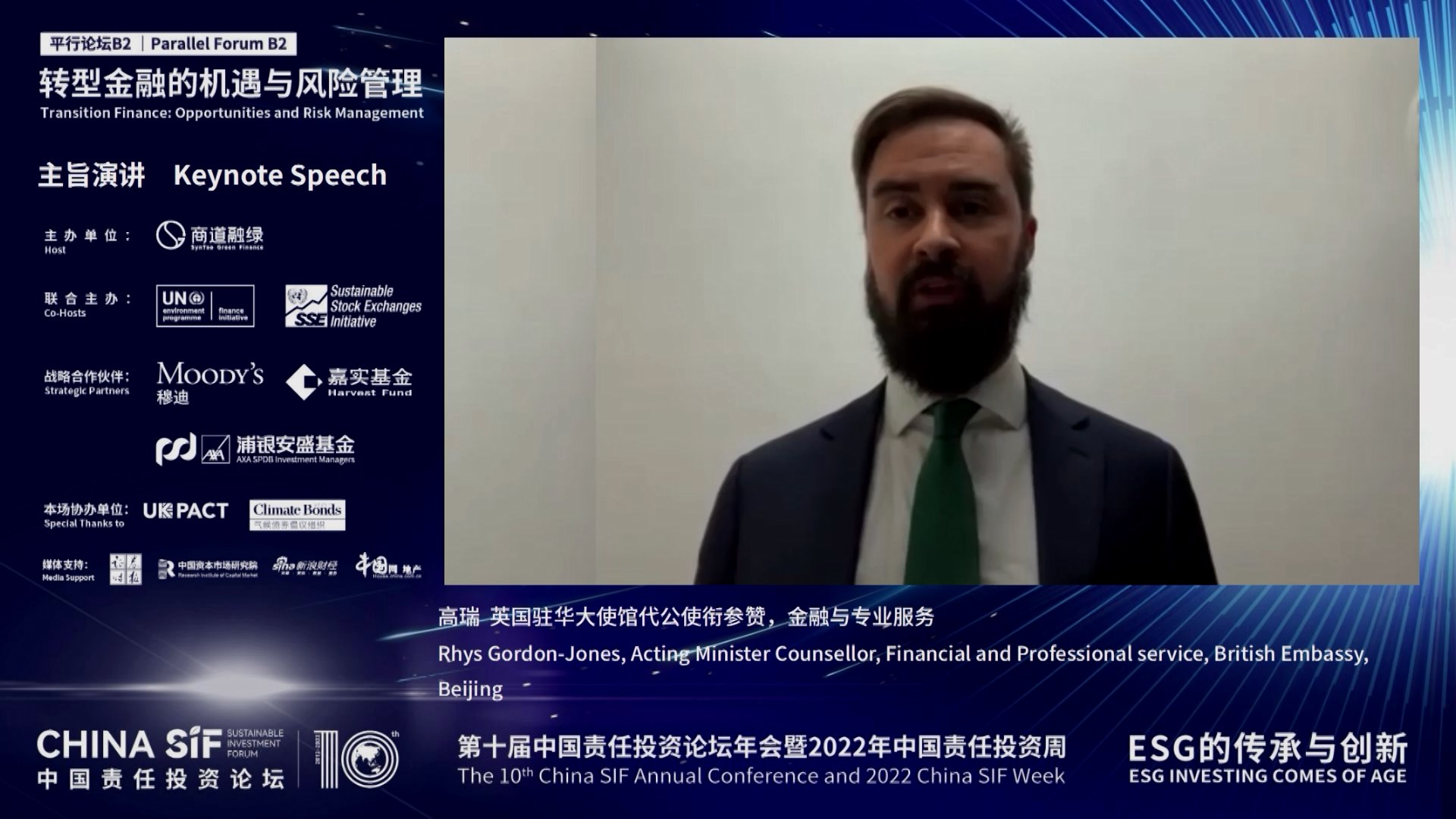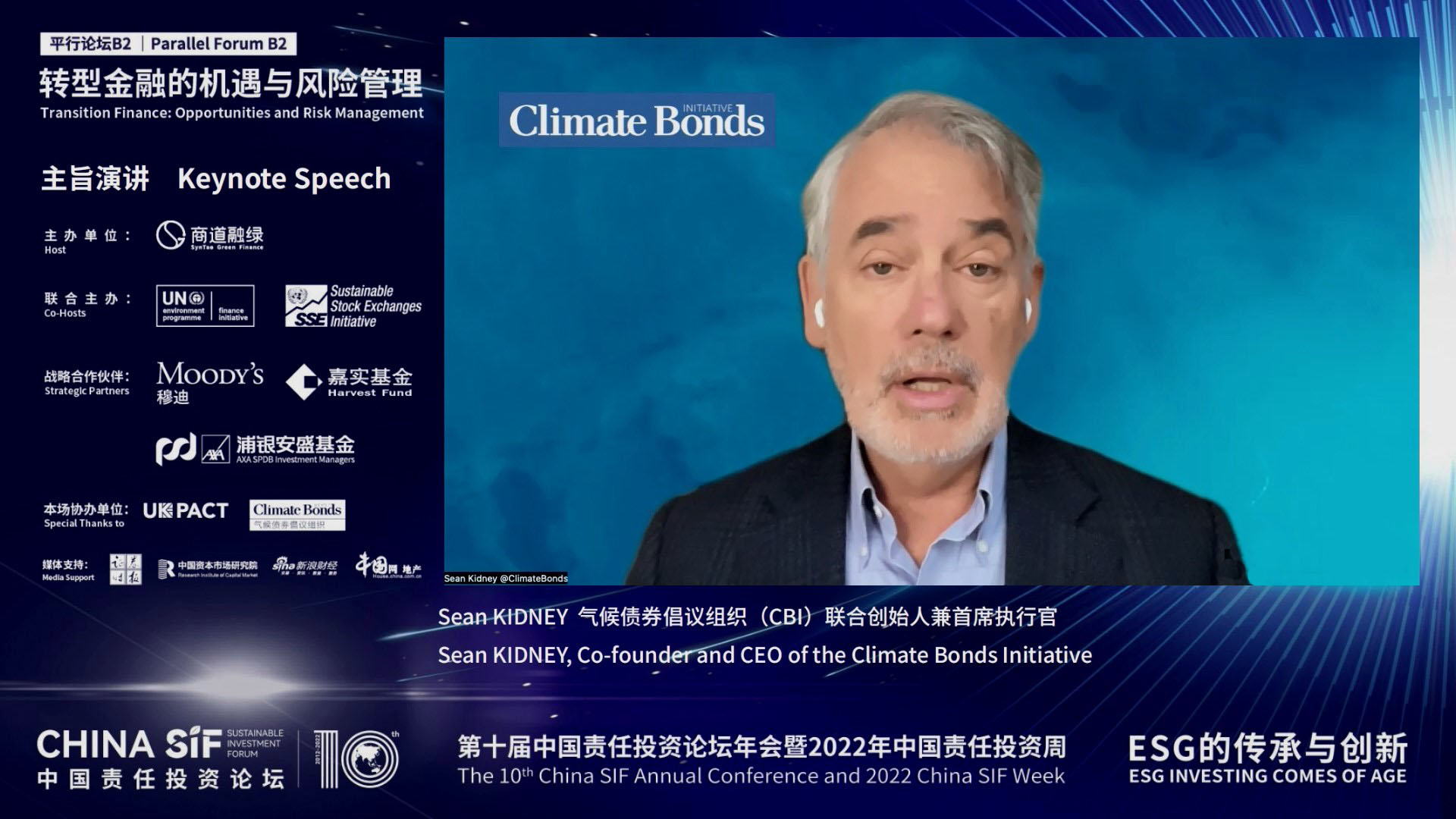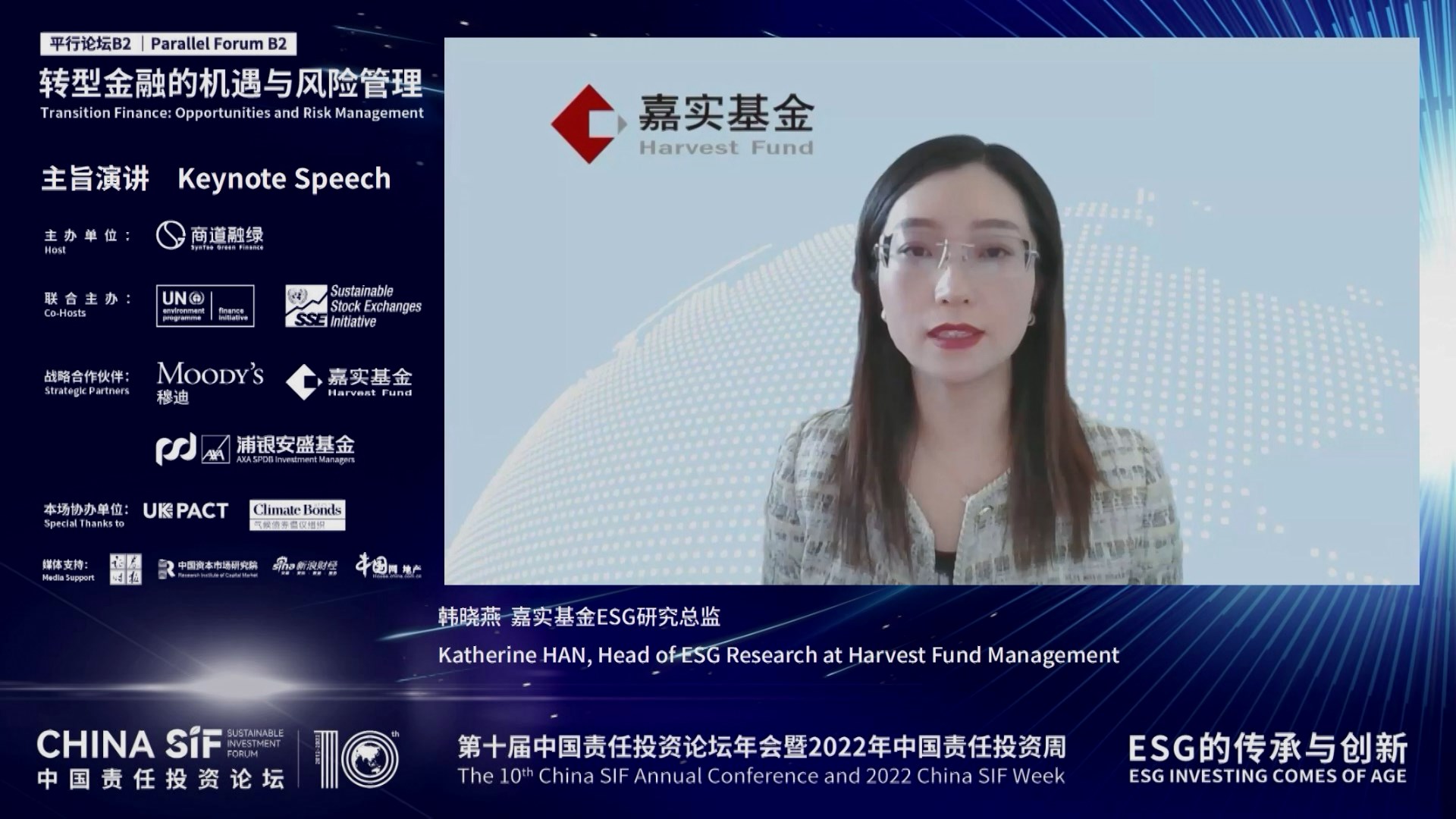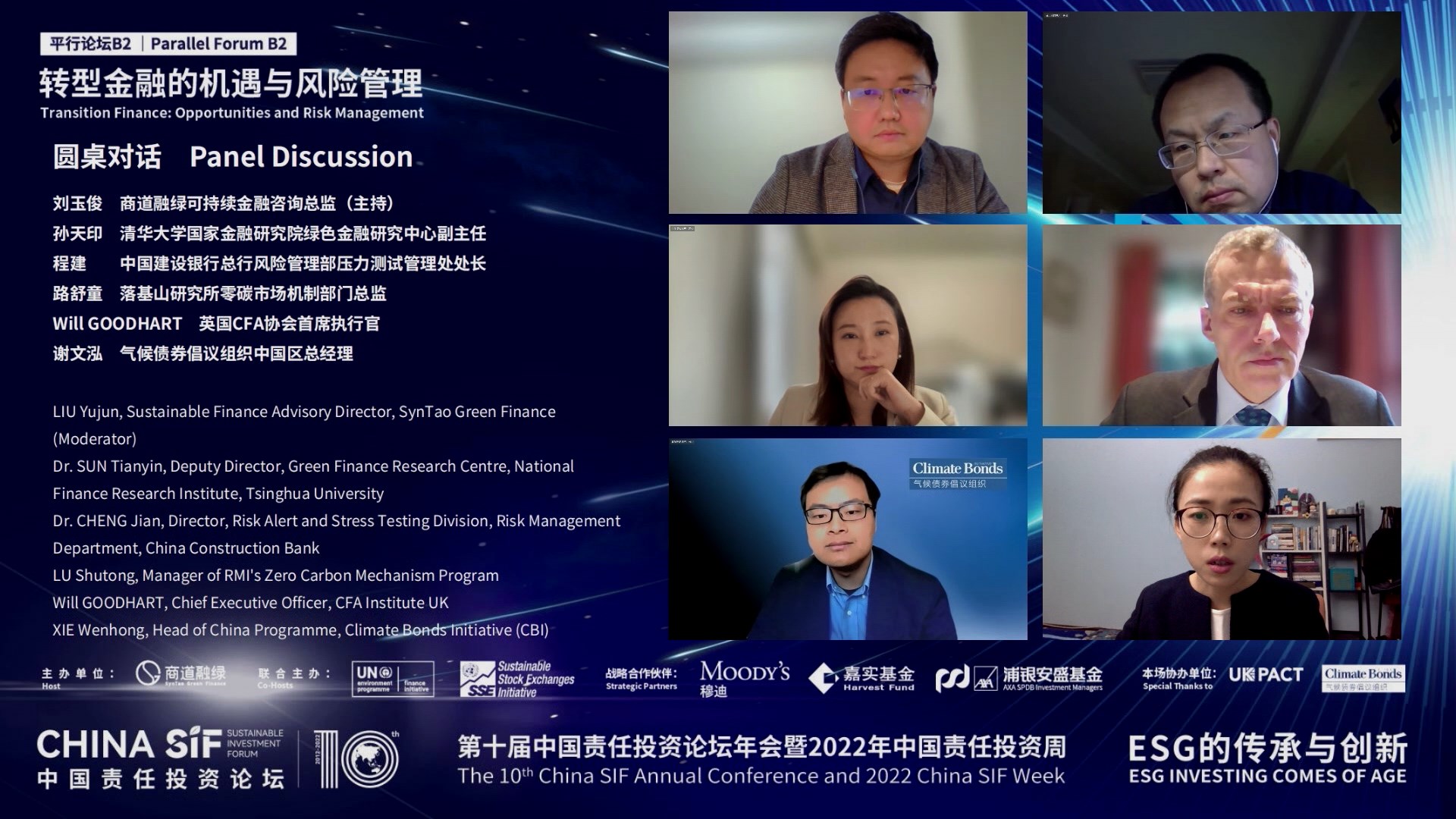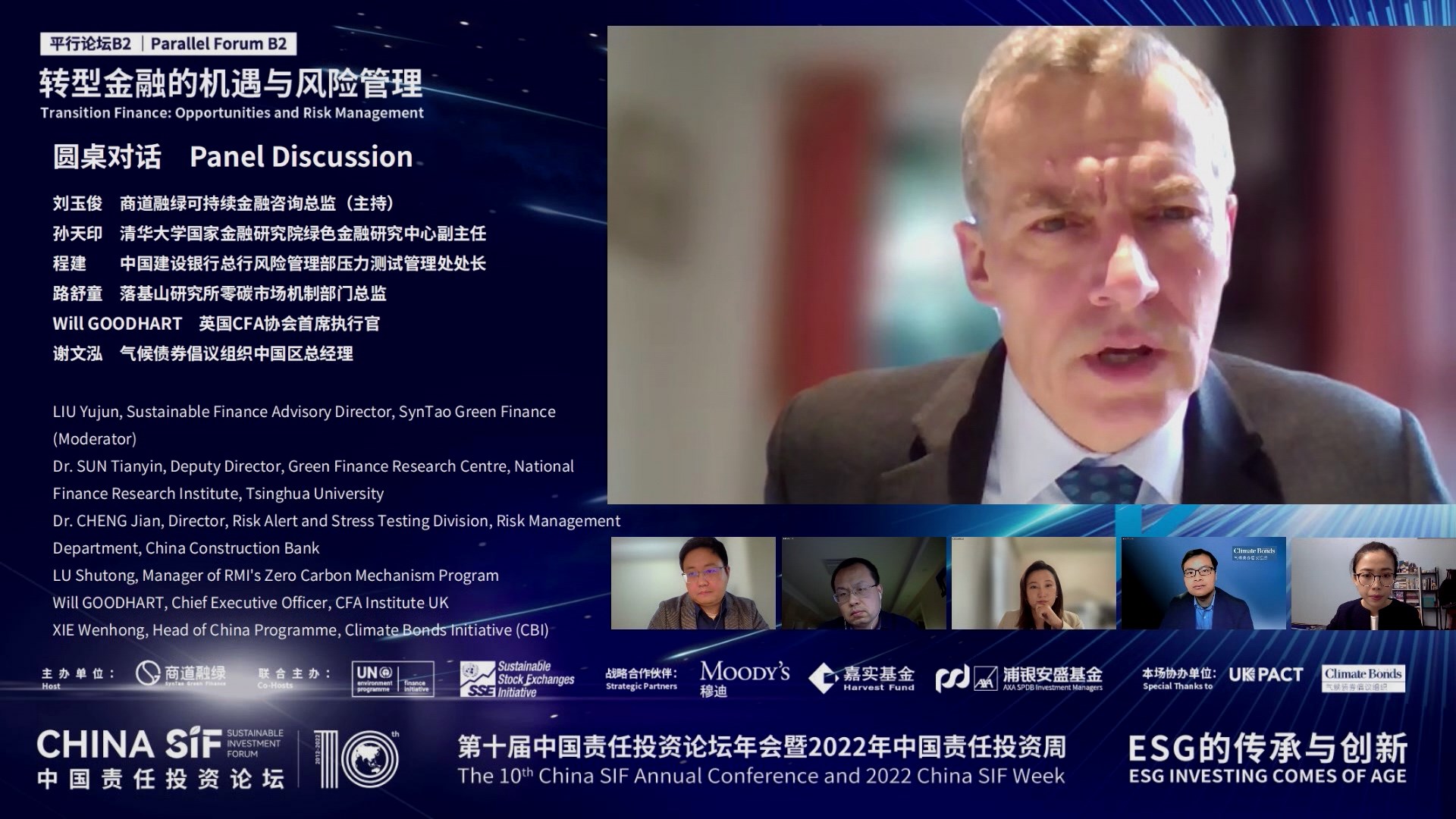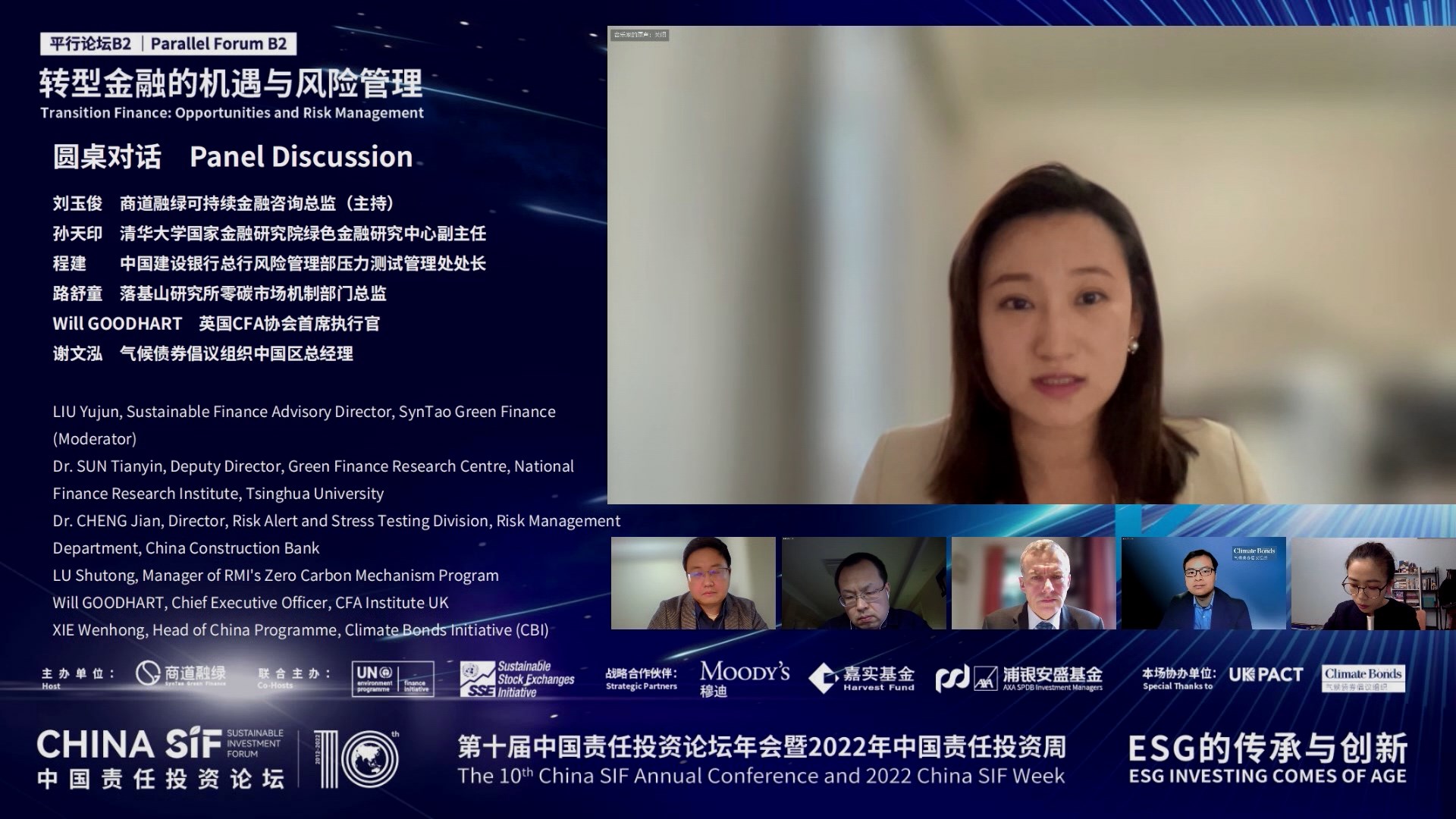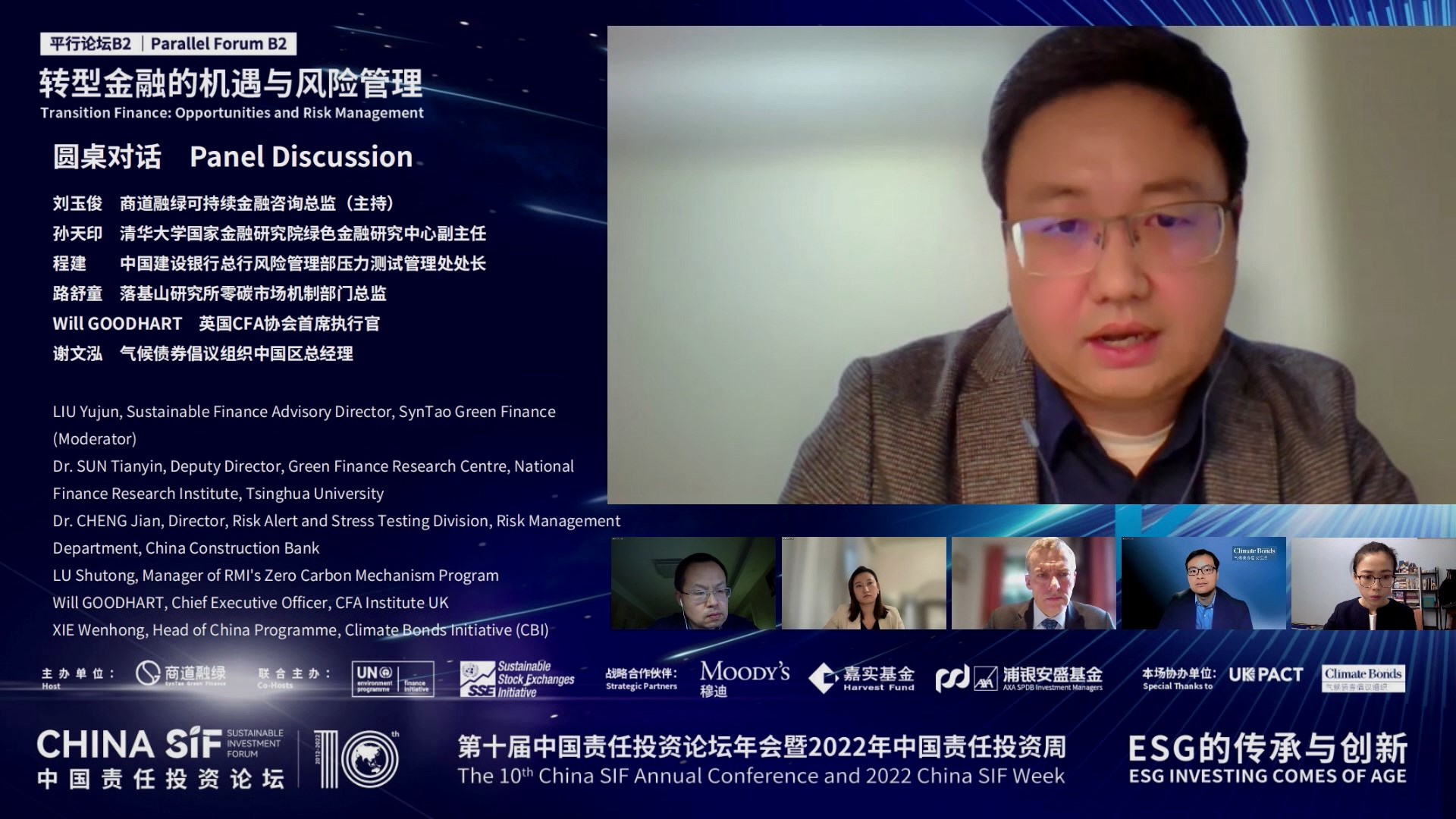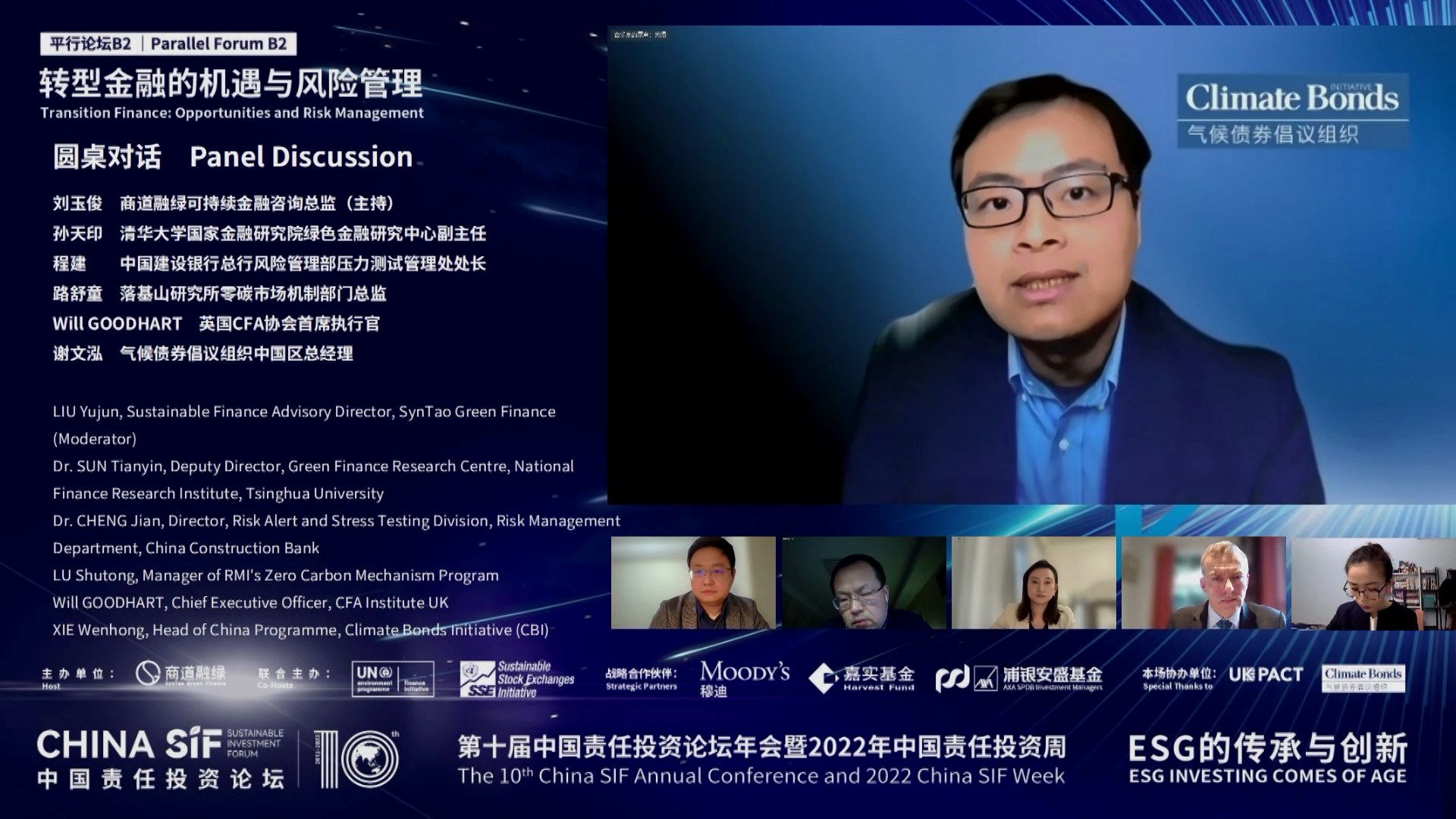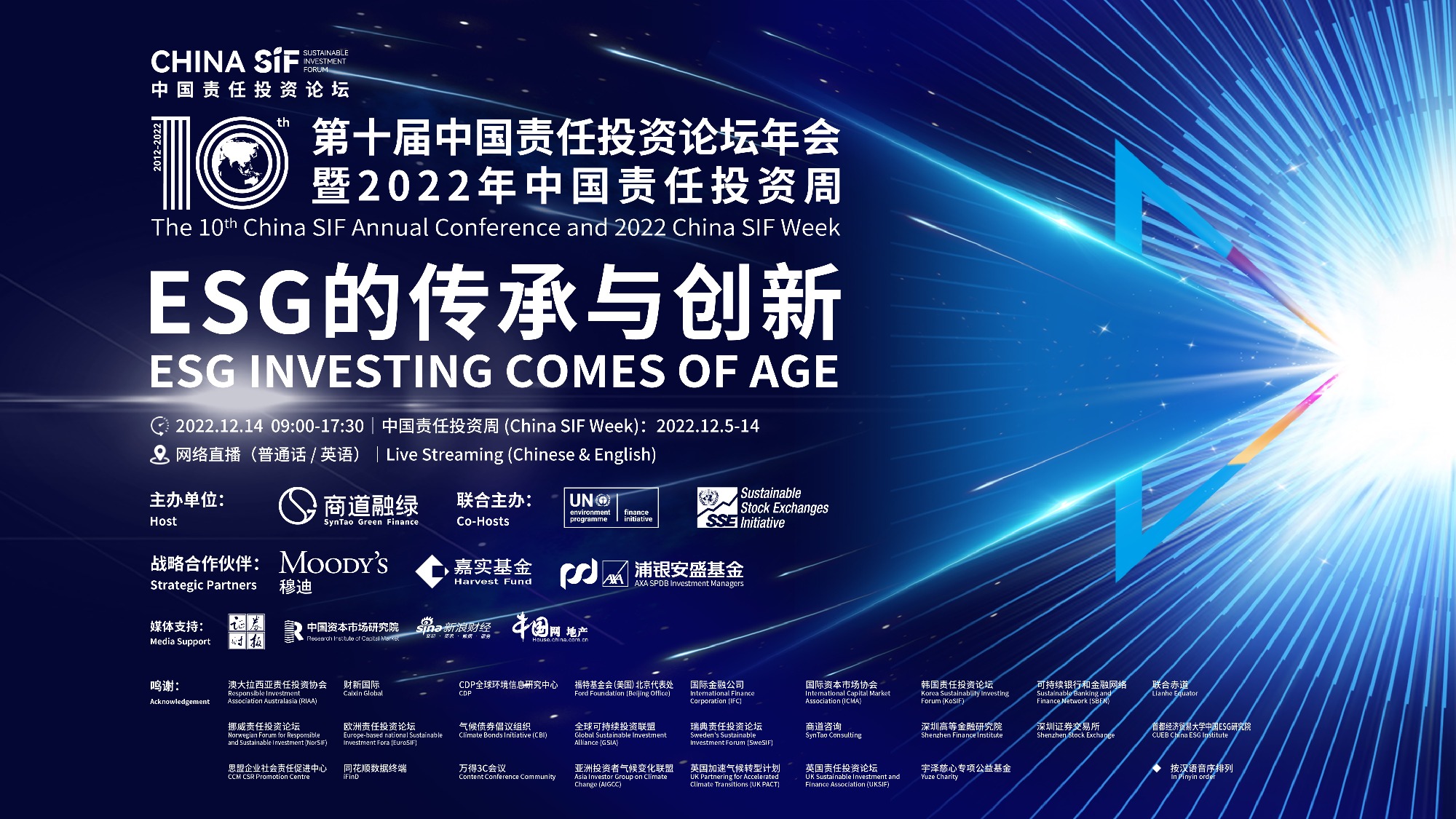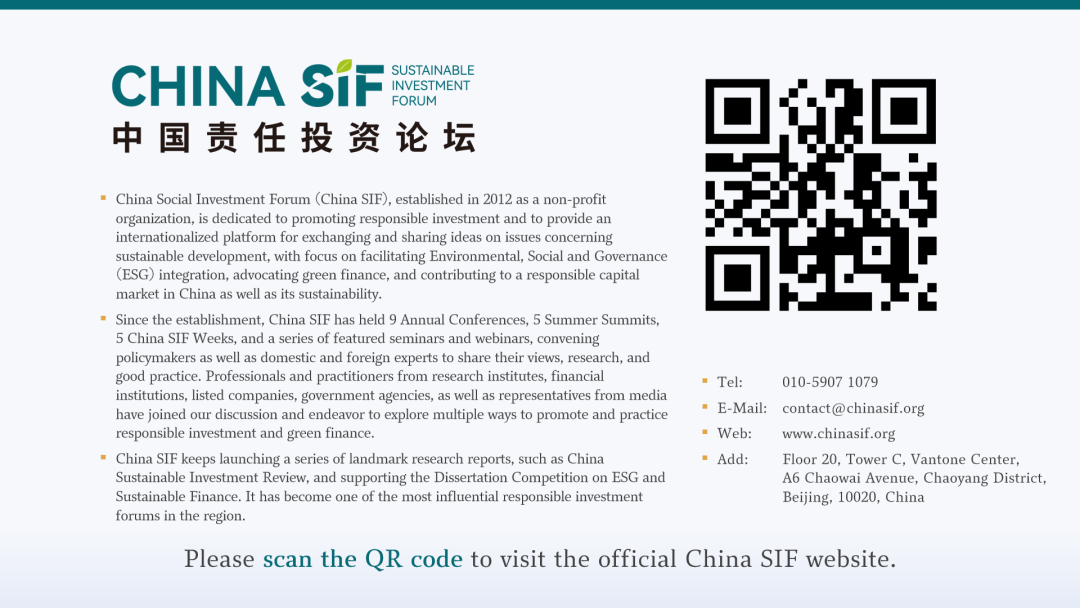On 14 December 2022, the 10th China SIF Annual Conference was successfully held online. China SIF was launched by SynTao Green Finance in 2012, marking a decade of success. During these ten years, China SIF has witnessed the rapid development of ESG investment at home and abroad, with more and more financial markets incorporating ESG regulation and many financial institutions developing and launching ESG investment products.
The 10th China Sustainable Investment Forum (China SIF) Annual Conference, organised by SynTao Green Finance and co-hosted by the United Nations Environment Programme Finance Initiative (UNEP FI) and the United Nations Sustainable Stock Exchange Initiative (UN SSEi), was successfully held online. This year's Conference was supported by strategic partners Moody's, Harvest Fund and AXA SPDB Investment Managers. As the grand finale of the China SIF Week 2022, the 10th Annual China SIF Conference was themed "ESG Investing Comes of Age", looking back on the development of ESG from its emergence and rise to its gradual maturation into the mainstream over the past decade, and looking forward to the prospects, trends and key features of ESG investment in the next decade.

The Parallel Forum B2 " Transition Finance: Opportunities and Risk Management" of this year's annual China SIF meeting was co-organized by UK PACT and Climate Bonds Initiative (CBI), and chaired by Liu Yujun, Sustainable Finance Advisory Director at SynTao Green Finance. During the keynote speech session, the Acting Minister Counsellor (Financial and Professional Services) of the British Embassy in China
Rhys Gordon-Jones, Co-Founder and CEO of Climate Bonds Initiative (CBI)
Sean KIDNEY, Head of ESG Research at Harvest Fund Management
Katherine HAN, Deputy General Manager of the Green Finance Department & Corporate Finance Department at the Bank of Jiangsu
Dr. DONG Shanning delivered keynote speeches.
Rhys Gordon-Jones, Acting Minister Counselor (Financial and Professional Services) of the British Embassy in China, introduced the progress and cooperation between China and the UK on transition finance, stating that we need to work together in the future to develop more innovative and high-standard financial instruments and promote higher-quality and wider disclosure of climate- and sustainability-related information to support low-carbon transition and low-carbon investment.
Sean KIDNEY, co-founder and CEO of the Climate Bonds Initiative (CBI), emphasized the necessity and urgency of transition finance, pointing out that the core of transition finance is to realize the low-carbon transition of carbon-intensive industries. In terms of energy transition, he believes that as the price of hydrogen continues to decline, green hydrogen can bring us the greatest possibility to achieve low-carbon transition.
Head of ESG Research at Harvest Fund Management
Katherine HAN introduced Harvest Fund's practical experience in integrating transition finance into the entire investment process. She said that the importance of transition finance has become increasingly prominent under the background that traditional carbon-intensive industries urgently need support related to transition technologies and funds, but these needs cannot be effectively satisfied under the current green financial system. The traditional method of voting with one's feet or "divestment" in the capital market is not conducive to supporting the smooth transition of the real economy. Professional investment institutions should be more active in exerting the influence of shareholders and professionalism, and empowering and supervising companies' green and low-carbon transition by regular stewardship.
Deputy General Manager of the Green Finance Department & Corporate Finance Department at the Bank of Jiangsu
Dr. DONG Shanning shared the recent exploration and practice of the Bank of Jiangsu in terms of environmental and social risk management. The Bank of Jiangsu carried out three rounds of stress tests to assess the impact of different levels of carbon prices on financial metrics such as the probability of default (PD) of credit assets, bad loan ratio, carbon value-at-risk, implied temperature rise, etc. In terms of transition opportunities, he said that Bank of Jiangsu seized transition finance opportunities mainly through the establishment of carbon accounts for customer companies, ESG ratings, and other innovative financial products. However, the difficulty lies in how to obtain customer companies' relevant energy consumption and production data.
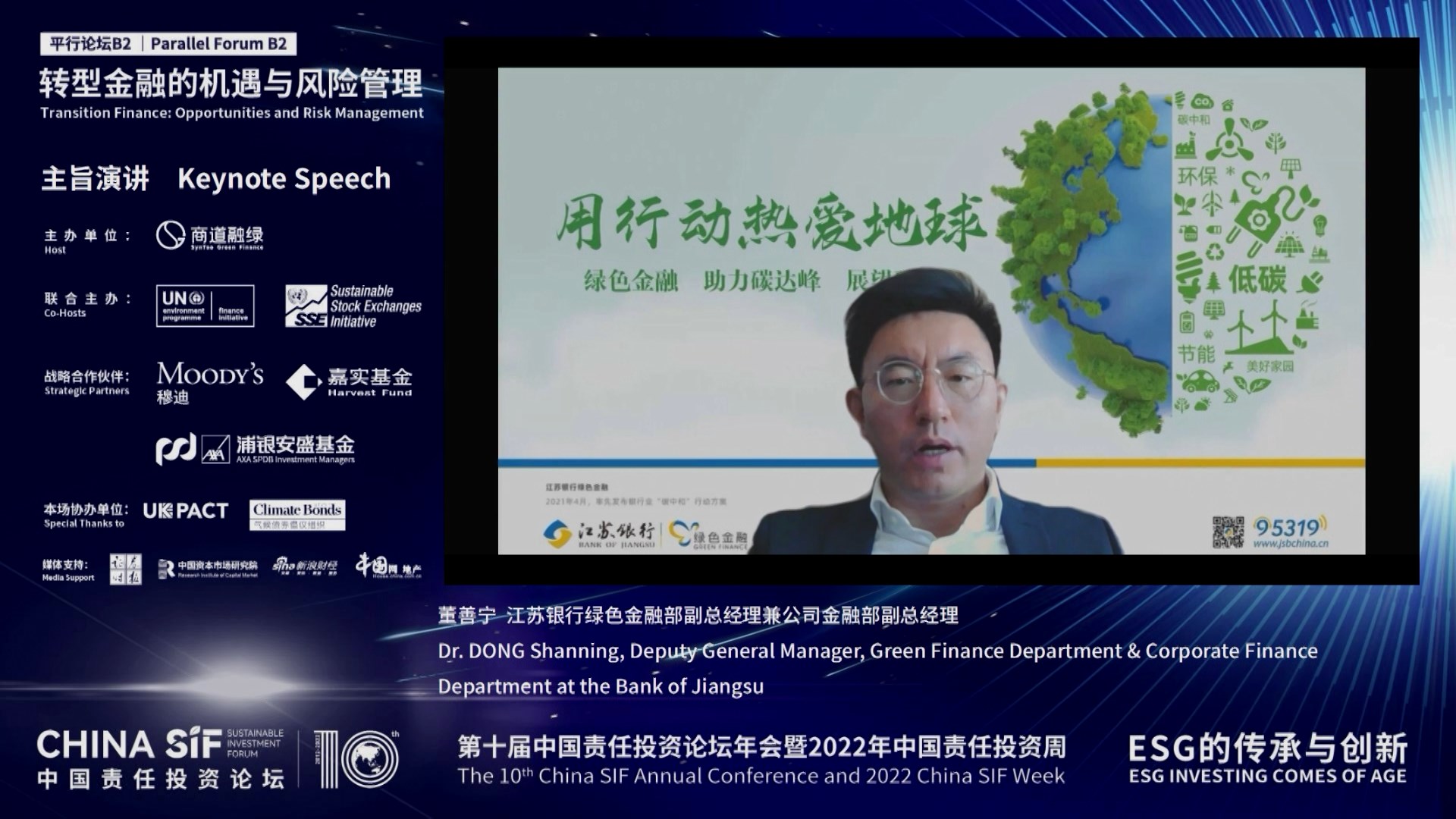
In the subsequent panel discussion session, representatives from domestic and foreign universities, banks, think tanks and research institutions had a few rounds of dialogue on the development trend, challenges, and countermeasures of transition finance in recent years.
The panelists first shared their insights on market demand for transition finance and its development trend in the past year.
Will GOODHART, CEO of the CFA Institute UK, pointed out that this year we have seen transition finance become much more central to plans for addressing climate change. Acceleration is perhaps most apparent in the extent to which net zero transition plans are beginning to be incorporated into regulation and policy. Despite positive policy development, we are still making a slow progress in terms of the practical introduction and application of transition plans. For example, there is some delay in taking actions such as disclosing climate-related information or having transition plans in place by heavy-emitting companies.
LU Shutong, Manager of Rocky Mountain Institute (RMI)'s Zero Carbon Mechanism Program, indicates that the implementation of transition finance requires many supporting mechanisms to help promote it, among which financial support is particularly important. She said that the market's awareness of transition finance is becoming clearer, and the demand for it is further increasing. There are mainly two driving forces. First, on the policy side, more governments have proposed the goal of net zero emissions. On the market side, market mechanisms such as the EU's carbon border tax mechanism and the further expansion of the China's domestic carbon market, have been promoting companies' transition as soon as possible.
Dr. SUN Tianyin, Deputy Director of Green Finance Research Centre at National Finance Research Institute, Tsinghua University, believes that the internal demand for transition finance has always existed. In the past, green finance in the traditional sense mainly focused on incremental pure green, low-carbon projects, but in the recent few years, the market has gradually realized that the low-carbon transition of carbon-intensive stock assets is a crucial part of achieving the carbon neutrality goal. He also emphasized that an orderly low-carbon transition is important, as disorderly transition will not only impede the achievement of carbon neutrality goals but will also cause economic and social problems. Taking the coal power industry as an example, he explained to us issues related to power supply security, employment, and social stability that can be caused by "rushing" carbon reduction, as well as the regional financial risks caused by the large number of stranding assets.
XIE Wenhong, Head of China Programme at Climate Bonds Initiative (CBI), said that compared to green-, social-, and sustainable bonds, transition-related instruments appeared relatively later in the debt market in the past two years, but its development momentum is much stronger. He also mentioned that because transition finance is still developing at the initial stage in terms of its standard unification, mechanism design, and product innovation, companies lack relevant guidelines and tools on a practical level. Although there are high-level consensuses in principle such as the "G20 Transition Finance Framework", there are significant differences in the transition activities across various industries. CBI is taking the lead in formulating industry-specific transition guidelines, which will be a useful supplement to the existing general framework consensus.
Dr. CHENG Jian, Director of Risk Alert and Stress Testing Division, Risk Management Department, China Construction Bank, summarized the three major developments of transition finance in the banking industry. First, policy action plans have been issued intensively, and the "1+N" system has initially taken shape. Second, financial regulatory standards are continuously brewing, and research on the standard system is also deepening. Lastly, financial institutions are actively practicing and exploring transition finance, and relevant tools and means are also enriched and improved.
The participants then discussed the progress made on the market side in improving issues such as "fake transition" and the lack of a solid and credible transition plan. LU Shutong believes that this problem is inevitable in the early stage of market development. In this phase, boundaries, standards, and related definitions for transition finance are still vague and inconsistent. However, in the future, with the development of more transition finance activities, the accumulation of more practical experiences, and with the help of some assessment tools, the risk of greenwashing or fake transition can be better managed. The development of such assessment tools should pay attention to two things – focusing on industry differences and ensuring the comprehensiveness of the assessment methodology.
XIE Wenhong mentioned that as regulators, investors, and the media are increasingly monitoring greenwashing and fake transition, financial institutions are becoming more cautious about making transition commitments. Within this context, CBI has released a series of transition finance white papers starting in 2020, classifying transition activities according to their characteristics, and proposing a series of main characteristics of corporate transition activities (such as whether they are compatible with the Paris Agreement goals, whether there are concrete actions, whether there is internal monitoring mechanism, etc.). This helps provide some reference for investors to evaluate the credibility of companies' transition plan.
In terms of the potential challenges brought by transition finance, Dr. SUN Tianyin indicates that there are currently four urgent challenges: the lack of guidance for industry-specific transition technological pathways, the lack of standards for designing a standardized transition plan, the imperfect information disclosure mechanism and key-indicator tracking mechanism, and lastly, insufficient incentive policies.
CHENG Jian pointed out three major difficulties for banks to carry out climate risk assessment and management. First, it is difficult to obtain climate-related data such as carbon emissions from client companies. Second, companies lack motivation to reduce emissions due to the mismatch between its benefits and costs. Third, there is a problem of mismatched time horizons; for companies and financial institutions, it is difficult to reflect the long-term climate risk management requirements in the operating financial indicators of each business cycle.
Will GOODHART said that the pursuit of perfection should not hinder the development of transition finance. He encouraged leaders of financial institutions, companies in the real economy, and regulatory authorities to quickly learn and practice the use of transition finance-related tools and methods while accumulating experience for improvement. He also mentioned that if we want to make progress, we must also pay attention to the issue of just transition.
In the final round of discussion, the panelists put forward suggestions for financial institutions and companies on conducting low-carbon transition and transition finance. Dr. SUN Tianyin said that companies should identify and formulate transition plans suitable for their own business development and in line with the general low-carbon transition path of the industry as soon as possible, establish a sound information disclosure system, and make full use of the advantages of transition finance policies and product supply to support the realization of their own transition strategies.
LU Shutong encourages financial institutions and the industry to actively engage in dialogue to understand each other's needs.
Will GOODHART believes that all parties should actively participate and show leadership to ensure that right institutions are given the right tools and authority to do the right things.
XIE Wenhong emphasized that companies need to formulate credible, low-carbon transition plans that are aligned with the Paris Agreement goals, as well as disclose short-, mid-, and long-term emissions reduction goals.
CHENG Jian proposed a three-pronged approach of integrating intelligence, technology, and financing, and encourages active cooperation with industry departments and regulatory agencies to improve policy standards and jointly promote the transition of customer companies.
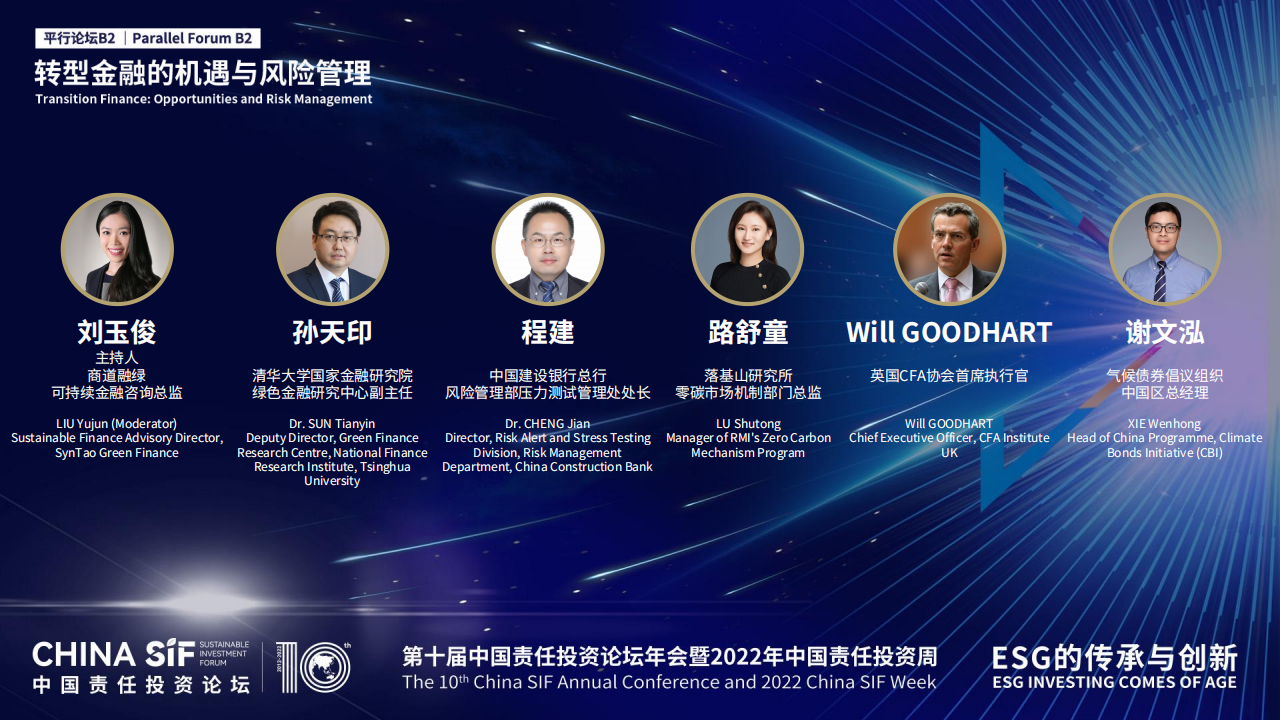
The 10th China SIF Annual Conference and the 2022 China SIF Week 2022 is supported by media including Securities Times, Sina Finance and house.china.com.cn. Acknowledgements to: Responsible Investment Association of Australasia (RIAA), Caixin International, CDP, Ford Foundation (Beijing Office), International Finance Corporation, International Capital Markets Association (ICMA), Korea Sustainability Investing Forum (Kosif), Sustainable Banking and Finance Network (SBFN), Lianhe Equator, Norwegian Forum for Responsible Sustainable Investment (Norsif), Europe- based national Sustainable Investment Fora (EuroSIF), Climate Bonds Initiative (CBI), Global Sustainable Investment Alliance (GSIA), Sweden's Sustainable Investment Forum (SweSIF), SynTao Consulting, Shenzhen Finance Institute, Shenzhen Stock Exchange, CUEB China ESG Institute, CCM CSR Promotion Centre, iFinD, Wind Content Conference Community, Asia Investor Group on Climate Change (AIGCC), UK Partnering for Accelerated Climate Transitions (UK PACT), UK Sustainable Investment and Finance Association (UKSIF), and Yuze Charity for the contribution to 2022 China SIF Week.
Prior to the Annual Conference, 2022 China SIF Week has already hosted a series of 11 Side Events covering various aspects of responsible investment such as Sustainable Agriculture, Bond Markets for Sustainable Development, Net Zero Investment Trends in Asia and Asset Owners' Expectations on ESG Investment in China, Academic Workshop on ESG Practice and Investment Return, Training on Sustainable Blue Economy and Climate Change Management, TCFD Training for Listed Companies, Climate and Sustainability Disclosure in Stock Exchanges, Wealth Management for A Good Cause, China's Overseas Responsible Investments and ESG Information Disclosure for Enterprises, etc. In addition, we have contacted eight organisations from the Global SIFs Network to jointly look at the next decade of global responsible investment in a webinar format.
More than 2,000 professionals from around the world registered for the 10th China SIF Annual Conference and 2022 China SIF Week. 8,265 views were recorded on the day of the live broadcast through the China SIF website (chinasif.org), Wind 3C Conference, iFinD Terminal and WeChat video, with a total of 114,254 minutes of viewing time. The number of registrations and live streams watched reached a new record high. Please contact the organisers for information on cooperation with China SIF and more at:
contact@syntaogf.com
About China SIF
China Sustainable Investment Forum (China SIF), established in Beijing as a non-profit organisation in 2012, was officially registered as a private non-enterprise unit in Shenzhen in 2016, the Jifeng Green Finance Promotion Center of Shenzhen City, is dedicated to promoting responsible investment and to provide an internationalised platform for exchanging and sharing ideas on issues concerning sustainable development, with focus on facilitating Environmental, Social and Governance (ESG) integration, advocating green finance, and contributing to a responsible capital market in China as well as its sustainability.
Since the establishment, China SIF has held 10 Annual Conferences, 5 Summer Summits, 6 China SIF Weeks, and a series of featured seminars and webinars, convening policymakers as well as domestic and foreign experts to share their views, research, and good practice. Professionals and practitioners from research institutes, financial institutions, listed companies, government agencies, as well as representatives from media have joined our discussion and endeavor to explore multiple ways to promote and practice responsible investment and green finance.
China SIF keeps launching a series of landmark research reports, such as China Sustainable Investment Review, supporting the Dissertation Competition on ESG and Sustainable Finance and developing the "ESG Online Classes" series of educational videos together with partners and industry experts to promote ESG investment concepts and practices. Over the years, China SIF has become one of the most influential responsible investment forums in the region.
Please visit
https://en.chinasif.org/ for more information.

